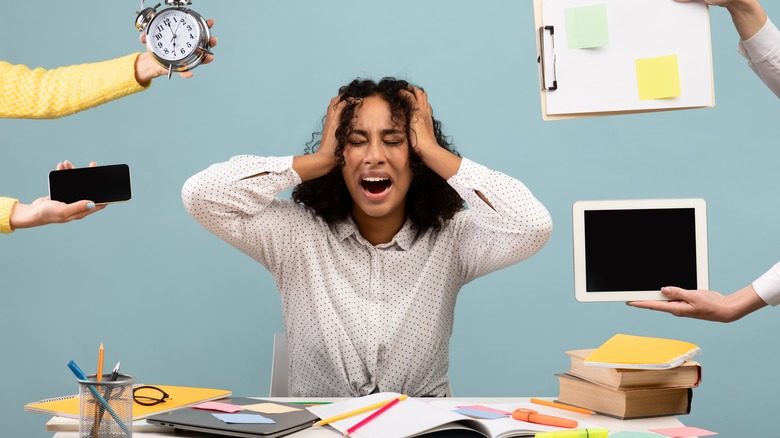What Happens To Your Brain When You Multitask?
Multitasking can feel a lot like juggling — as in, keeping multiple balls in the air at once. Too many balls and we're likely to drop one at some point. Is this what happens in our brain when we multitask? In other words, does multitasking overload our brain, or could it make it stronger?
Many of us regularly walk and talk, eat and text, or email while watching TV. But just because we're capable of multitasking doesn't mean we're doing it well. Adult and geriatric psychiatrist and director of the Pacific Neuroscience Institute's Pacific Brain Health Center Dr. David A. Merrill explains via LiveStrong, "The human brain is not designed to do two things at once. When you do that, there's a cost."
Researchers from the National Institute of Neurological Disorders and Stroke have traced the area of the brain responsible for multitasking through the use of imaging technology. In their study, it was found that when humans focus on a task, blood flow is directed towards the area of the brain required for that task. Study findings revealed the area of the brain that receives increased blood flow when we multitask is the prefrontal cortex.
So what exactly happens in the prefrontal cortex when we're switching between tasks?
Opposite tasks may be easier to complete than similar tasks
When multitasking, the brain is forced to continuously redirect its focus, ultimately leading to diminished performance on each task (via LiveStrong). This can also impact memory, as multitasking reduces our brain's ability to retain and encode incoming information.
Science has shown that multitasking reduces productivity by as much as 40%, according to researchers at Aalto University. Their 2017 study further revealed that the speed at which we switch between tasks can also impact neural activity. By showing participants 50-second segments of three action movies, it was determined that shorter durations of watch time resulted in "fragmented continuity," while a watch time of 6.5 minutes per film allowed for more optimal brain function.
Interestingly, the brain struggles more when you try to do activities that are similar in nature at the same time, and less when the tasks have different cognitive needs. Graduate student researcher at Princeton University Abigail Novick Hoskin explains via BrainFacts.org, "In simple terms, you may be able to walk down the street while talking with a friend but it becomes much harder to talk to your friend while you are trying to write an essay unrelated to whatever the two of you are talking about. That's because walking and talking involve two different brain systems but talking and writing will share a system. In the latter situation, it's like you have two trains trying to use the same tracks in order to go in different directions — it just doesn't work."

